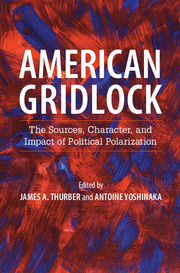Book contents
- Frontmatter
- Dedication
- Contents
- List of contributors
- Foreword
- Acknowledgments
- Introduction
- PART I POLARIZATION AMONG VOTERS AND ACTIVISTS
- PART II POLARIZATION IN NATIONAL INSTITUTIONS
- PART III POLARIZATION IN THE STATES
- PART IV POLARIZATION IN THE MEDIA
- 12 Partisan Media and Electoral Polarization in 2012: Evidence from the American National Election Study
- 13 News as a Casualty: District Polarization and Media Coverage of U.S. House Campaigns
- 14 More a Symptom Than a Cause: Polarization and Partisan News Media in America
- 15 The Polarizing Effects of Partisan and Mainstream News
- PART V IMPLICATIONS AND CONCLUSIONS
- Index
- References
12 - Partisan Media and Electoral Polarization in 2012: Evidence from the American National Election Study
from PART IV - POLARIZATION IN THE MEDIA
Published online by Cambridge University Press: 05 November 2015
- Frontmatter
- Dedication
- Contents
- List of contributors
- Foreword
- Acknowledgments
- Introduction
- PART I POLARIZATION AMONG VOTERS AND ACTIVISTS
- PART II POLARIZATION IN NATIONAL INSTITUTIONS
- PART III POLARIZATION IN THE STATES
- PART IV POLARIZATION IN THE MEDIA
- 12 Partisan Media and Electoral Polarization in 2012: Evidence from the American National Election Study
- 13 News as a Casualty: District Polarization and Media Coverage of U.S. House Campaigns
- 14 More a Symptom Than a Cause: Polarization and Partisan News Media in America
- 15 The Polarizing Effects of Partisan and Mainstream News
- PART V IMPLICATIONS AND CONCLUSIONS
- Index
- References
Summary
After widening for several decades, partisan divisions among ordinary Americans over issues, ideology, evaluations of leaders, and, in notable instances, perceptions of political, economic, and scientific realities, reached new extremes during Barack Obamae's presidency. These trends coincided with the proliferation of partisan news and opinion outlets enabled by the spread of cable television, talk radio, and the Internet, raising the question of how these two phenomena might be related. The 2012 American National Election Study (ANES) offered a unique perspective on this question by asking, along with its usual battery of political questions, whether respondents attended to any of 34 specific television, radio, newspaper, and Internet sources of news and opinion programs. These sources are distinguishable as conservative, liberal or mainstream, allowing the analysis of the relationship between the ideological and partisan leanings of the sources voters reported using and their political beliefs, attitudes and behavior. The results of this analysis support several conclusions:
• As expected, most people who do attend to partisan media chose sources that could be relied on to confirm rather than challenge their existing attitudes and opinions; partisans showed a clear preference for sources of news and opinion that reliably fit their biases.
• Modal opinions, beliefs, and behaviors varied strongly with variations in the use of partisan media. Media choice was strongly related to voters’ assessments of Barack Obama, the Affordable Care Act, gun control, and climate change, as well as their to comparative affect toward Obama and Romney and their parties, their presidential choice, and their expectations about who would win the White House.
• These relationships were not merely an artifact of voters selecting congenial partisan media; even after controlling statistically for the effects of a variety of variables that would predict selective exposure to partisan media, actual exposure continued to have a significant effect on attitudes, beliefs, and reported behavior. The conservative media were particularly influential in this regard. Voters’ use of partisan and ideologically slanted media outlets thus contributed appreciably to (as well as reflected) the high levels of partisan polarization of opinions of the presidential candidates, parties, and issues in 2012.
• The effects of partisan media use varied in ways that systematically echoed variations in the emphasis of partisan messages and thus were most pronounced on issues where conservative and liberal media took clear and emphatic contrary positions – particularly regarding Obama.
- Type
- Chapter
- Information
- American GridlockThe Sources, Character, and Impact of Political Polarization, pp. 259 - 286Publisher: Cambridge University PressPrint publication year: 2015
References
- 5
- Cited by



